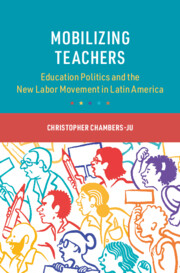Book contents
- Mobilizing Teachers
- Cambridge Studies in the Comparative Politics of Education
- Mobilizing Teachers
- Copyright page
- Dedication
- Contents
- Figures
- Tables
- Preface and Acknowledgments
- Abbreviations
- 1 Why Teachers?
- 2 How Union Organizations Shape Teacher Mobilization
- 3 The Origins of National Teacher Organizations
- 4 Organizational Consolidation in Mexico
- 5 Instrumentalism in Mexico
- 6 Organizational Weakening in Argentina
- 7 Movementism in Argentina
- 8 Factionalism in Colombia
- 9 Leftism in Colombia
- 10 Teacher Politics in Comparative Perspective
- References
- Index
4 - Organizational Consolidation in Mexico
Published online by Cambridge University Press: 16 May 2024
- Mobilizing Teachers
- Cambridge Studies in the Comparative Politics of Education
- Mobilizing Teachers
- Copyright page
- Dedication
- Contents
- Figures
- Tables
- Preface and Acknowledgments
- Abbreviations
- 1 Why Teachers?
- 2 How Union Organizations Shape Teacher Mobilization
- 3 The Origins of National Teacher Organizations
- 4 Organizational Consolidation in Mexico
- 5 Instrumentalism in Mexico
- 6 Organizational Weakening in Argentina
- 7 Movementism in Argentina
- 8 Factionalism in Colombia
- 9 Leftism in Colombia
- 10 Teacher Politics in Comparative Perspective
- References
- Index
Summary
This chapter analyzes the organizational prerequisites for the strategy of instrumentalism, by charting changes in the organizational structure of the National Educational Workers Union (SNTE) of Mexico in the 1980s and 1990s. It examines the threats to the corporatist model posed by the dissident movement and the regime response to help the union leadership regain control. President Carlos Salinas sheltered the union from the potentially disruptive effects of education decentralization policies and strengthened SNTE with policies to improve teacher pay. These concessions shaped the union’s internal organization, providing the resources Elba Esther Gordillo needed to build a dominant faction. The consolidation of power in the national union leadership was crucial for the strategy of instrumentalism.
- Type
- Chapter
- Information
- Mobilizing TeachersEducation Politics and the New Labor Movement in Latin America, pp. 70 - 88Publisher: Cambridge University PressPrint publication year: 2024

